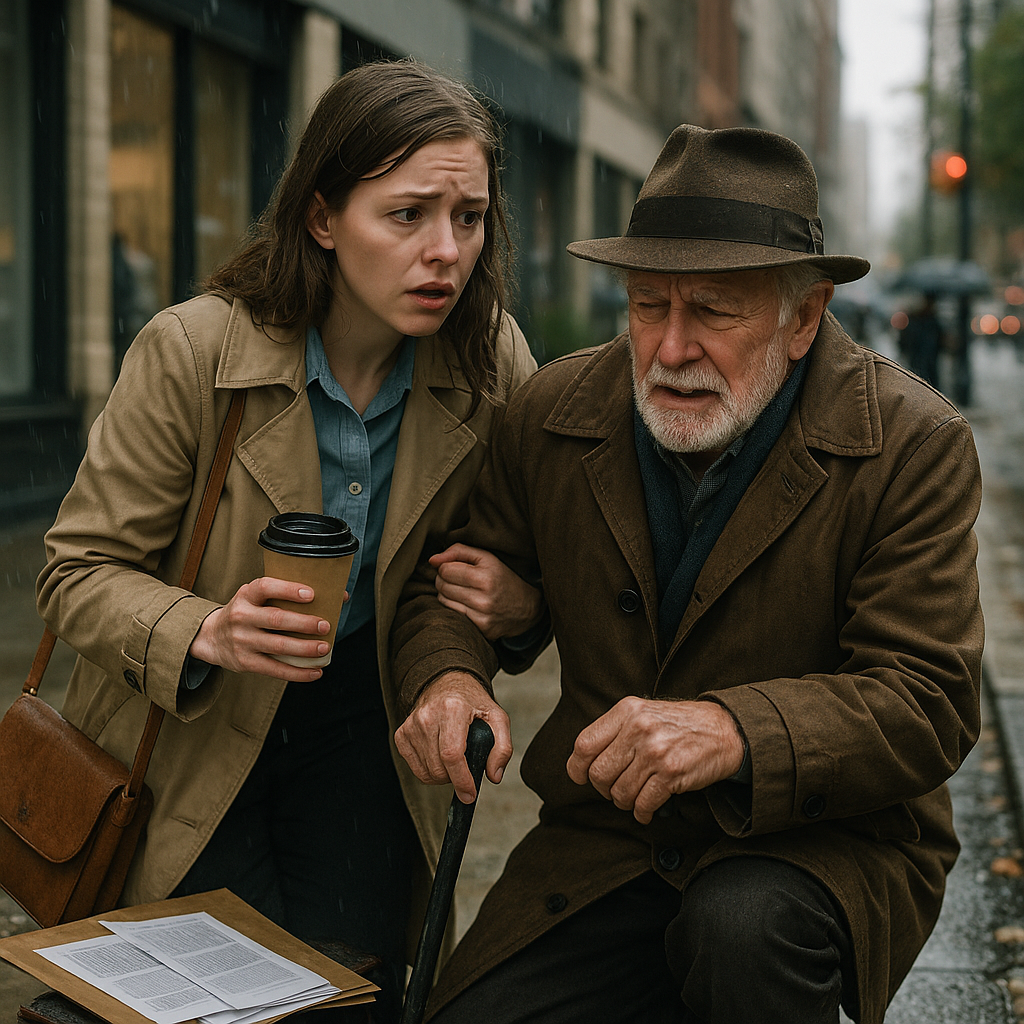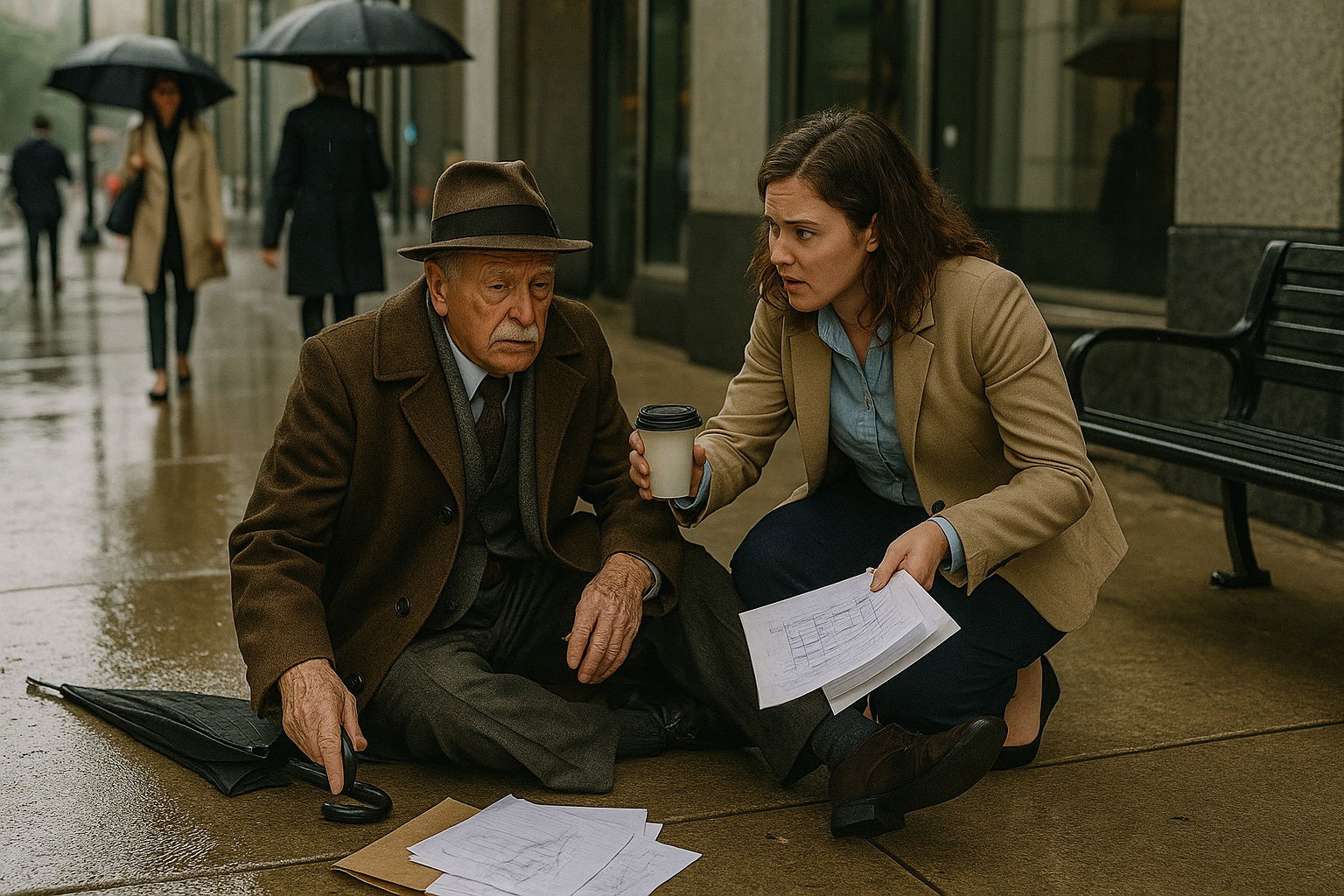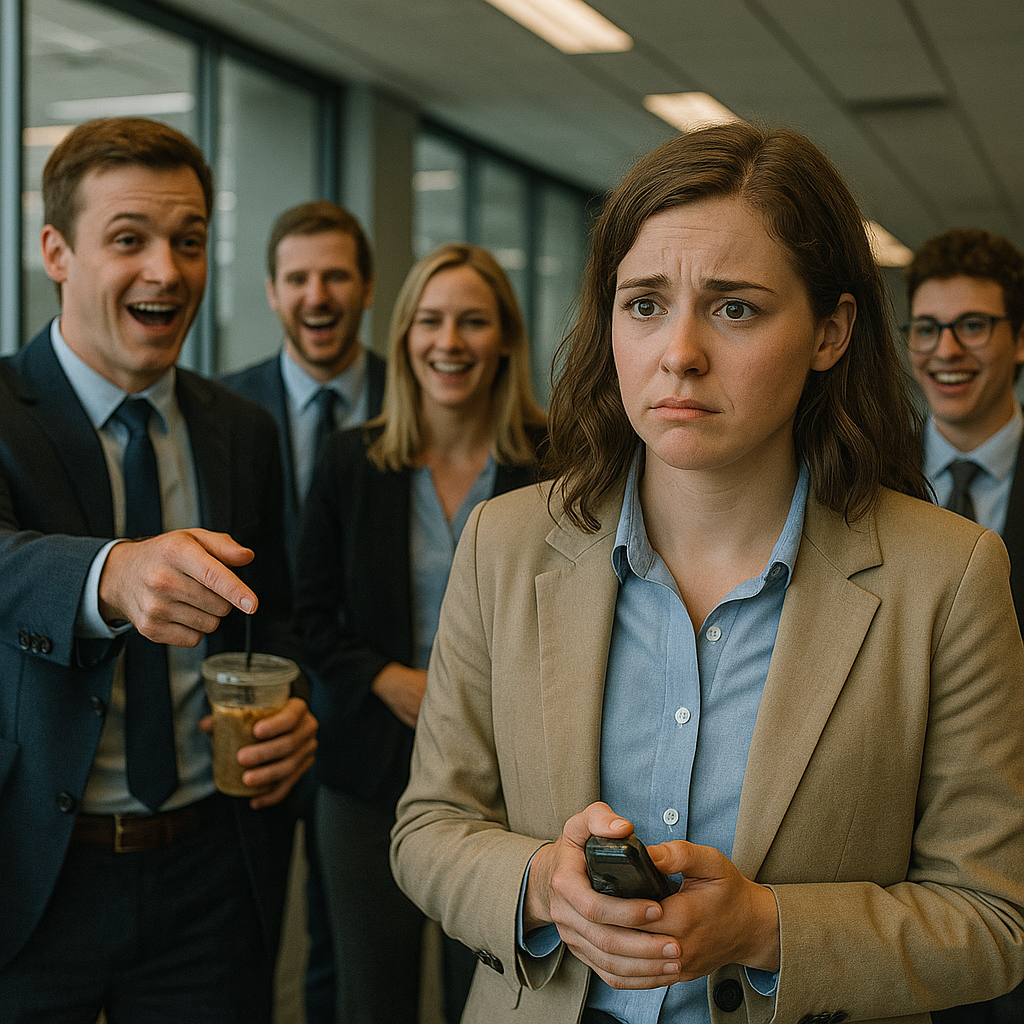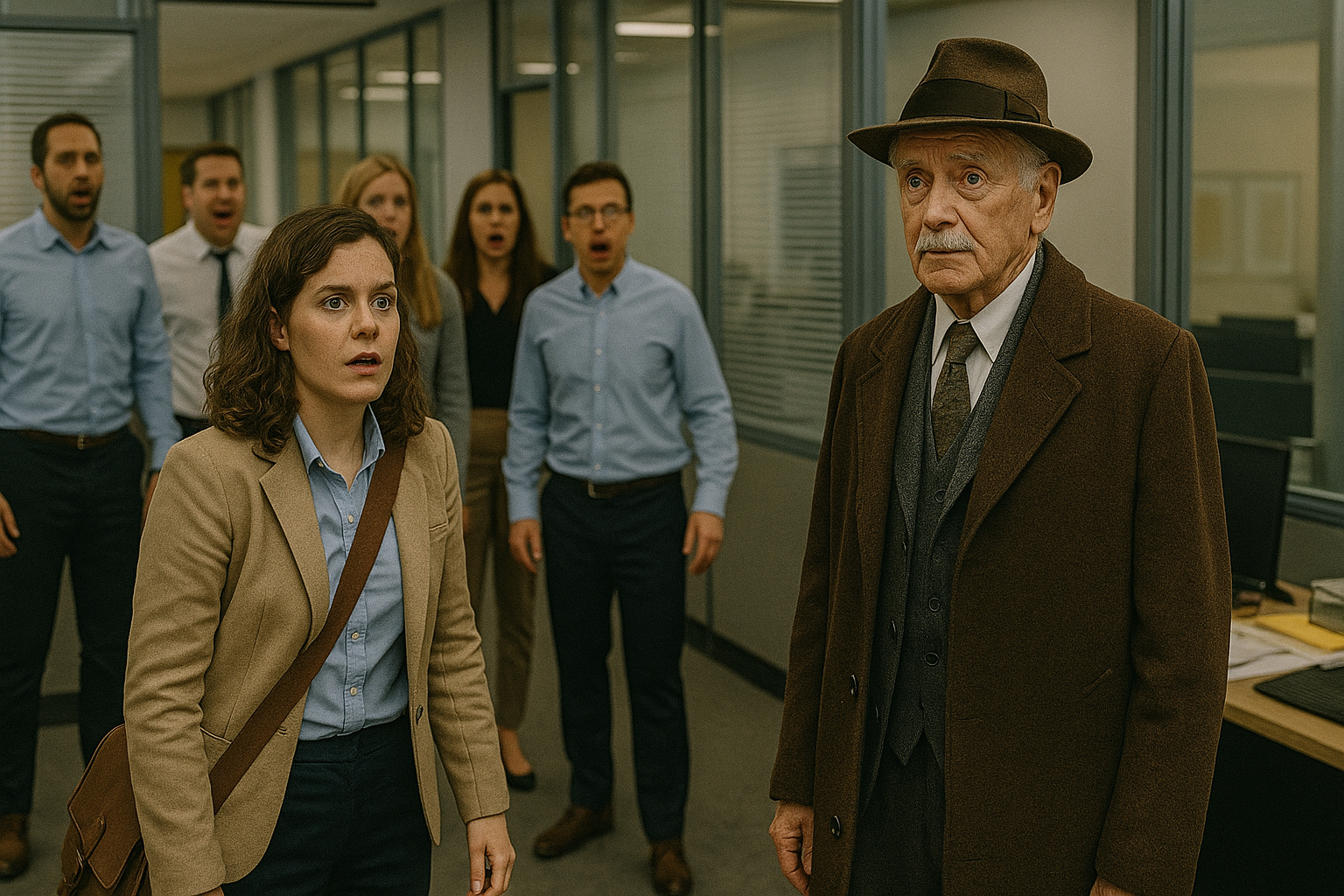I was the intern they all laughed at—until one rainy afternoon changed everything.
My name is Sarah Collins. I was twenty-three, fresh out of college, and just a few weeks into my internship at Halstead & Grant Financial, one of the most prestigious investment firms in New York City. I’d landed the position after three grueling rounds of interviews, and while I knew it was a golden opportunity, nothing could have prepared me for the rigid hierarchy and icy atmosphere of the office.
Interns were treated like shadows—seen, but not heard. You fetched coffee, made copies, smiled at rude remarks, and thanked people who didn’t know your name. I was the only intern who still took the elevator instead of squeezing into the service stairwell to avoid being seen by the executives.
But that day… that one rainy Thursday… everything changed.
It had been pouring since morning, and by mid-afternoon, Manhattan’s sidewalks were slick and gray. I’d just stepped out to pick up coffee for the analysts on the 14th floor—six customized orders from three different cafés, because heaven forbid someone didn’t get their vanilla oat milk latte.
I was balancing the tray awkwardly under my raincoat, the wind whipping at my hair, when I saw an elderly man slip and fall on the curb right outside our building.

He was tall but frail, wearing an old brown trench coat and a soaked fedora. His umbrella had flown down the street, and his briefcase lay open, papers strewn across the wet pavement.
People just… kept walking. Dozens of well-dressed professionals, umbrellas in hand, heels clicking, eyes down. Some paused, stared, then walked around him.
I hesitated. The coffee was getting cold, and I knew how furious the team upstairs would be if I came back late. But the man was struggling. One leg bent awkwardly. He was trying to push himself up with shaking arms.
I put the coffee tray down in a dry corner under the awning and rushed to him.
“Sir, are you hurt?” I asked gently, kneeling beside him.
He looked up. His eyes were kind but filled with pain. “Think I twisted my knee,” he mumbled. “Don’t have the same reflexes I used to.”
I helped him sit up, then slowly guided him onto the nearby bench. He grimaced as I checked his leg.
“Let me call an ambulance,” I said.
“No, no,” he waved a trembling hand. “I’ll be alright. Just… give me a minute.”
I noticed his papers fluttering in the wind and quickly ran to gather them before they were ruined. Most were architectural sketches, notes, and what looked like a proposal. They were hand-drawn, elegant—beautiful, really.
“Thank you,” he said, surprised I had bothered.
I offered him my coffee. “It’s not fancy, just regular drip, but it’s warm.”
He smiled, touched. “You’re a rare soul.”

Suddenly, I heard laughter behind me.
“Oh look, our little intern’s playing nurse,” came a mocking voice.
I turned. It was Kyle, one of the junior analysts, flanked by a few others. They were holding their iced espressos, looking smug.
“Careful, Sarah,” Kyle continued, “You help too many homeless guys and you’ll miss your big break in coffee delivery.”
The others laughed. I felt heat rise in my cheeks. I wanted to snap back, but the old man gently rested his hand on mine.
“They don’t know what kindness is. But one day they’ll learn,” he said softly.
Eventually, I helped him hail a cab. Before getting in, he turned to me.
“You have a good heart, young lady. Don’t lose that.”
He pressed a slightly crumpled card into my hand. It had his name: Arthur Wellington. No company name, just a phone number.
“Thank you, Mr. Wellington,” I said, still feeling awkward and embarrassed as the others watched.
Back upstairs, I got chewed out by Kyle for being fifteen minutes late. No one cared why.
But three days later, everything changed.
That Monday morning, the entire office was buzzing. A surprise visit from one of the firm’s “silent board members” was scheduled. Rumors swirled—someone from the founding family? A major investor?
I was in the corner of the conference room, setting up the projector for the weekly meeting, when the elevator doors opened—and in walked the same old man I’d helped.
Arthur Wellington.
Except now, he wasn’t just an old man in a fedora. He was in a tailored navy suit, walking confidently with a polished cane, and flanked by two assistants.
Kyle’s face drained of color.
Mr. Halstead, the firm’s co-founder, rushed forward with a wide smile. “Arthur! We didn’t expect you in person!”
“I thought it was time,” Arthur said, voice calm but commanding. “Time I met the new faces… and saw what kind of people we’re growing in this firm.”

I stood frozen, holding the HDMI cable.
Arthur’s eyes scanned the room—and landed on me. His face broke into a warm smile.
“There she is,” he said.
Everyone turned.
“The young lady who reminded me this company was once built on compassion, not just capital.”
Dead silence.
Kyle choked on his coffee.
Arthur stepped forward and took the clicker from my hand. “Let me tell you a little story,” he said. “Last Thursday, I slipped on the street. Dozens of people passed me by. Only one stopped. She didn’t know who I was. Didn’t care. She helped anyway.”
He turned to the room. “I founded Wellington Architecture Group in 1969. I sold it in the ‘80s and became one of the early investors in this firm. I don’t interfere much—unless I see something that concerns me.”
No one breathed.
“I’ve seen some things that worry me,” he continued. “Entitlement. Arrogance. A culture where kindness is mocked.”
His gaze flicked to Kyle.
“But I’ve also seen hope.”
He walked over and put his hand on my shoulder.
“Sarah Collins. I’d like to personally mentor her. Effective immediately, she’ll be promoted to a junior associate. And I expect she’ll be involved in the upcoming Midtown development project.”
The room burst into whispers. Kyle looked like he might faint.
I couldn’t speak. My hands trembled as I stammered, “Mr. Wellington, I—I don’t know what to say…”
He chuckled. “Just keep being exactly who you are.”

From that day forward, everything changed.
I had an office. A real one. With a door. My name was on the project board. Executives suddenly knew how to pronounce it.
Arthur kept his promise. He met with me weekly, taught me everything he knew about architecture, business, and leadership. But more than that, he taught me about legacy.
“You can design buildings that scrape the sky,” he once told me, “but if you forget the people on the street, you’ve built nothing worth remembering.”
One afternoon, I asked him why he’d been out in the rain that day.
He smiled. “I go for walks near our old Midtown site. Keeps me grounded. I saw something in your eyes that day, Sarah. A reflection of who we were, and who we should be again.”
Three years later, I was leading that Midtown redevelopment. I hired interns from underfunded schools, created community spaces in every design, and named the project “Wellington Commons”—in honor of the man who changed my life.
As for Kyle? He resigned shortly after. No one really talks about him anymore.
But every now and then, when I’m rushing down a New York street and see someone stumble or drop a bag, I stop. I kneel. I help.
Because you never know who that person might be.
Or how much that one act of kindness might change everything.
Moral of the Story: Sometimes, the smallest gesture reveals the greatest character. Never be ashamed of kindness—even if others mock you for it. You might just be helping someone who changes your life forever.


